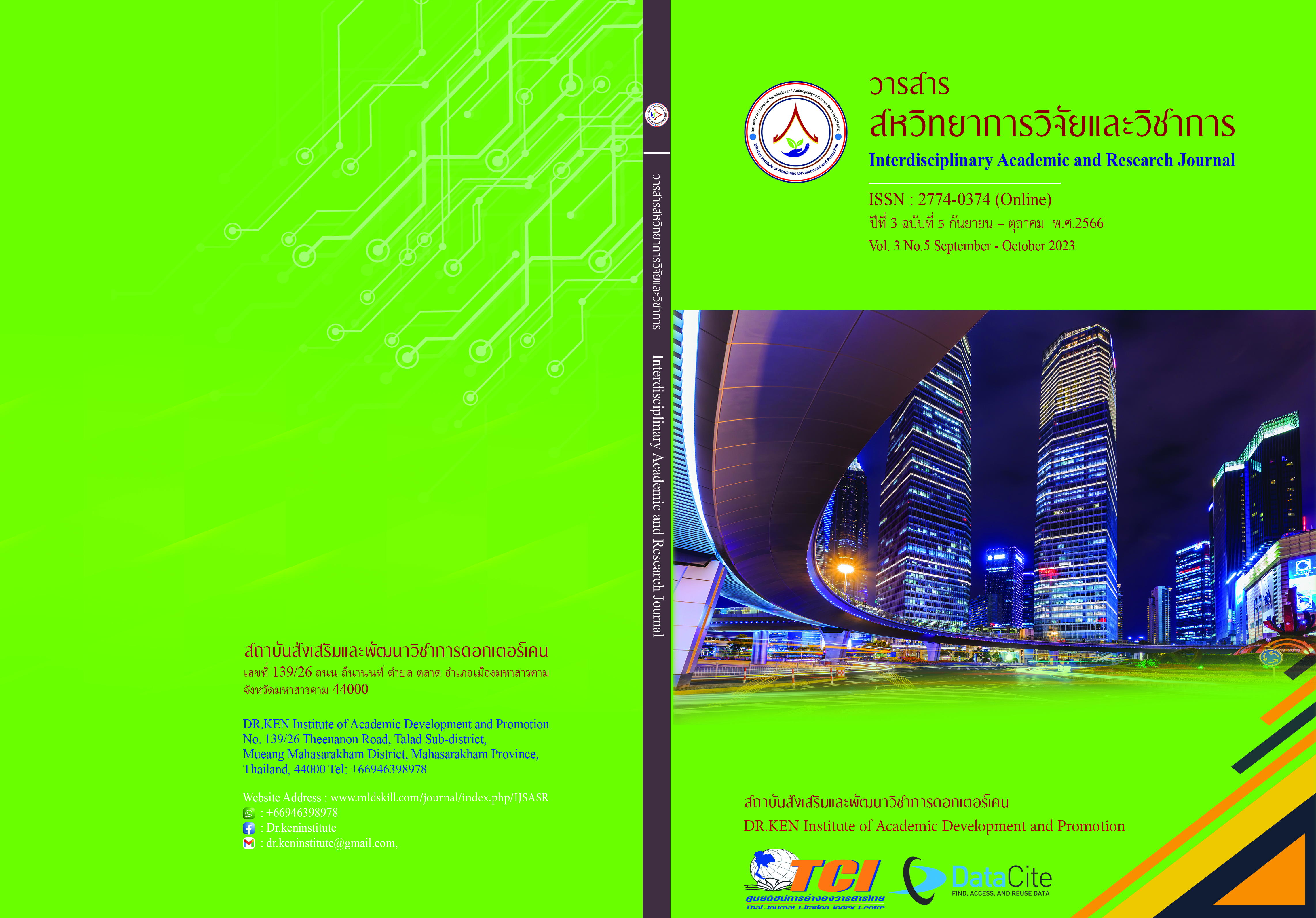Guidelines for Utilizing the Standard Evaluation Results of the Educational Service Area Office for Academic Affairs Administration Quality Development in Thailand
DOI:
https://doi.org/10.14456/iarj.2023.257Keywords:
Utilizing the Standard Evaluation Results; , Academic Affairs Administration; , Quality DevelopmentAbstract
Standardized assessments support the learning and confidence of those involved in the process, and the results of the assessments can be used to more effectively plan or improve projects. Therefore, in evaluating the performance and management of agencies at the policy level, it is necessary to use the evaluation results as important information for policy formulation. Thus, the aims of this research are as follows: (1) to study the implementation of the Educational Service Area Office ‘s Standard evaluation results to improve academic administration; (2) to develop a guideline for utilization of the standard Educational Service Area Office evaluation results for quality development of the academic affairs administration; (3) to examine the guidelines for utilization of the standard Educational Service Area Office evaluation results for quality development of the academic affairs administration. The target groups in this research by purposive sampling: (1) 121 executives and educational staff at the Educational Service Area Office: (2) five experts and executives of the Office of the Basic Education Commission.The research instruments were an interview and a questionnaire. The data were analyzed using frequency, percentage, mean, standard deviation statistics, and content analysis. The research findings were as follows: (1) the implementation of the standard evaluation results improved the quality of academic administration in five aspects by a Deming circle (PDCA) as a framework 96.67%; (2) guidelines for utilization of the standard evaluation and the results of the Educational Service Area Office for quality development of academic affairs administration, consisting of five components: (2.1) principles of Utilization-Focused Evaluation; (2.2) Objectives;(2.3) the process is planning the use of assessment results (Plan), implementation of the evaluation results (Do), assessment of the quality of evaluation results (Check), improvements quality (Action); (2.4) stakeholders and roles; and (2.5) conditions and limitations; (3) the quality assessment of guidelines for utilization of the standard evaluation and the results of the Educational Service Area Office for quality development of academic affairs administration were at the highest level.
References
จำรัส นองมาก. (2545). การประกันคุณภาพการศึกษาอย่างถูกต้องและมีความสุข. กรุงเทพฯ: ฟิสิกส์ เซ็นเตอร์
โชดก ปัญญาวรานันท์. (2556). การพัฒนานโยบายการบริหารงานวิชาการที่ส่งผลทางบวกต่อผลสัมฤทธิ์ทางการเรียนของนักเรียนในสถานศึกษาสังกัดกรุงเทพมหานคร. วิทยานิพนธ์ปริญญาครุศาสตร์ดุษฎีบัณฑิต: จุฬาลงกรณ์มหาวิทยาลัย.
ดรุณี รัตนสุนทร, อินทร์ จันทร์เจริญ, และวีรพันธุ์ ศิริฤทธิ์. (2560). วัฒนธรรมองค์กรที่มีผลต่อการบริหาร การศึกษาของสำนักงานส่งเสริมการศึกษานอกระบบและการศึกษาตามอัธยาศัย จังหวักเชียงราย.วารสารอิเล็กทรอนิกส์ Veridian มหาวิทยาลัยศิลปากร (มนุษยศาสตร์สังคมศาสตร์และศิลปะ),10 (2), 365-378.
ธนวิน ณ น่าน. (2554). การศึกษาปัจจัยที่ส่งผลต่อการนำผลการประเมินคุณภาพภายนอกไปใช้เพื่อพัฒนาคุณภาพสถานศึกษาขั้นพื้นฐาน สังกัดสำนักงานเขตพื้นที่การศึกษาพิษณุโลก.วิทยานิพนธ์ปริญญาครุศาสตรมหาบัณฑิต: มหาวิทยาลัยราชภัฏพิบูลสงคราม.
รัตนะ บัวสนธ์ (2562). การวิจัยและพัฒนานวัตกรรมการศึกษา. กรุงเทพฯ: สำนักพิมพ์จุฬาลงกรณ์มหาวิทยาลัย.
ฤกษ์รัตน์ ปักกันต์ธร. (2556). การประเมินโดยมุ่งเน้นผู้ใช้ประโยชน์: กรอบแนวคิดและแนวทาง. วารสารบริหารธุรกิจ เศรษฐศาสตร์และการสื่อสาร, 8(2), 31- 42.
ศิริชัย กาญจนวาสี. (2562). ทฤษฎีการประเมิน. (พิมพ์ครั้งที่ 9). กรุงเทพฯ: สำนักพิมพ์จุฬาลงกรณ์มหาวิทยาลัย.
สำนักงานคณะกรรมการการศึกษาขั้นพื้นฐาน. (2563). รายงานผลการติดตามและประเมินผลการบริหารและการจัดการศึกษาขั้นพื้นฐานของสำนักงานเขตพื้นที่การศึกษาตามมาตรฐานสำนักงานเขตพื้นที่การศึกษา พ.ศ. 2560 ประจำปีงบประมาณ พ.ศ. 2563. กรุงเทพฯ: เอ็น เอ รัตนะเทรดดิ้ง.
Alkin, M. C. (1985). A guide for evaluation decision-makers. Beverly Hills, CA: Sage.
Alkin, M. C., Daillak, R., & White, P. (1979). Using evaluations: Does evaluation make a difference? (Vol. 76). Sage Library of Social Research. Beverly Hills, CA: Sage
Beyer, J. M., & Trice, H. M. (1982). The Utilization Process: A Conceptual Framework and Synthesis of Empirical Findings. Administrative Science Quarterly, 27(4), 591-622.
Cousins, J. B., & Leithwood, K. A. (1986). Current empirical research on evaluation utilization. Review of Educational Research, 56(3), 331-364. https://doi.org/10.2307/1170319
Deming, E. W. (1986). Out of the crisis. Cambridge, UK: Massachusetts Institute of Technology Press.
Deming, W.E. (1950). Elementary Principles of the Statistical Control of Quality. JUSE.
Greene, M. (1988). The dialectic of freedom. New York: Teachers. College Press
Johnson, B.J. (1998). Toward a theoretical model of evaluation utilization. Evaluation and Program Planning, 21, 93-110.
O.E. Owen, E. Kavle, R.S. Owen, M. Polansky, S. Caprio, M.A. Mozzoli, Z.V. Kendrick, M.C. Bushman, G. Boden. (1986). A reappraisal of caloric requirements in healthy women. The American Journal of Clinical Nutrition, 44, 1–19. https://doi.org/10.1093/ajcn/44.1.1
Patton, M. Q. (2008). Utilization-Focused Evaluation (4th.). London: Sage Publication.
Patton, M. Q. (2012). Essentials of utilization-focused evaluation. Thousand Oaks, Calif: Sage Publication.
Preskill, H., & Caracelli, V. (2003). Current and Developing Concepts of Use: Evaluation Use TIG
Scriven, M. (1981). Evaluation Thesaurus. 3rd edition. CA: Edgepress Inverness.
Stufflebeam D. L., Zhang G. (2017). The CIPP evaluation model: How to evaluate for improvement and accountability. New York, NY: Guilford.
Weiss, R.L. (1980). Strategic Behavioral Marital Therapy: Toward a Model for Assessment and Intervention, Vol. 1. In: Vincent, J.P., Ed., Advances in Family Intervention, Assessment and Theory, JAI Press, Greenwich, 229-271.
Downloads
Published
How to Cite
Issue
Section
License
Copyright (c) 2023 Sireetorn Waiprib, Taviga Tungprapa , Ong-art Naiyapatana

This work is licensed under a Creative Commons Attribution-NonCommercial-NoDerivatives 4.0 International License.
Copyright on any article in the Interdisciplinary Academic and Research Journal is retained by the author(s) under the under the Creative Commons Attribution-NonCommercial-NoDerivatives 4.0 International License. Permission to use text, content, images, etc. of publication. Any user to read, download, copy, distribute, print, search, or link to the full texts of articles, crawl them for indexing, pass them as data to software, or use them for any other lawful purpose. But do not use it for commercial use or with the intent to benefit any business.
















.png)


